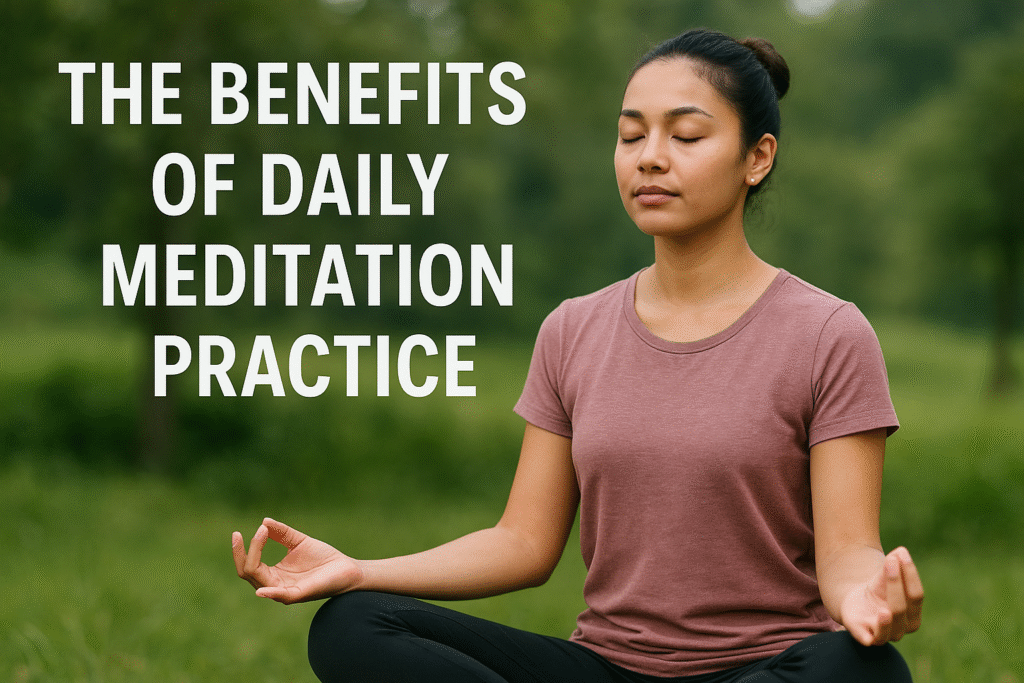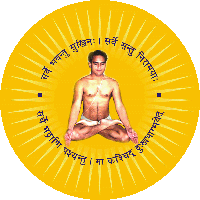
In our busy modern lives, we run from one task to another—meetings, deadlines, family responsibilities, social commitments—often without taking a pause to breathe deeply and just be. The result? Stress, anxiety, scattered thinking, and a feeling of being disconnected from ourselves.
But for thousands of years, our ancient rishis and yogis have given us a simple yet powerful solution—Meditation. Known in Sanskrit as Dhyana, it is one of the eight limbs of yoga as described in Patanjali Yoga Sutras. Far from being just a spiritual ritual, meditation is a practical life skill that can bring balance, clarity, and joy to every aspect of life.
In this blog, we’ll explore the benefits of daily meditation practice—not just from a spiritual angle, but also for the mind, body, and relationships—rooted in ancient Indian wisdom and supported by modern science.
The Yogic Understanding of Meditation
Meditation (Dhyana) is a process of gently turning our attention inward, withdrawing from the constant noise of the senses, and resting in our own awareness. The yogis described it as Sakshi Bhava—being a witness to thoughts, emotions, and sensations without getting entangled in them.
In the Ashtanga Yoga path, meditation is preceded by:
- Yama and Niyama – Ethical living and self-discipline
- Asana – Steady posture
- Pranayama – Regulation of breath
- Pratyahara – Withdrawal from distractions
- Dharana – Concentration
These naturally lead to Dhyana—effortless awareness.
Patanjali defines yoga itself as “Yogas Chitta Vritti Nirodhah”—Yoga is the stilling of the fluctuations of the mind. Daily meditation is a direct path to this stillness.
Benefits of Daily Meditation Practice
1. Reduces Stress and Anxiety
Modern life keeps us in a constant state of fight-or-flight. Meditation activates the body’s parasympathetic nervous system, bringing calmness and relaxation.
Ancient View: Yogis practiced meditation to cultivate Shanti (peace) and detach from dukkha (suffering) caused by over-identification with thoughts.
Practical Tip: Even 10 minutes of morning meditation can make your whole day more peaceful.
2. Improves Focus and Mental Clarity
When the mind is scattered, productivity drops. Meditation trains the mind to stay present, improving concentration.
Ancient View: Dharana (one-pointed focus) is the foundation of meditation. Over time, this focus extends to all tasks in life.
Modern Insight: Neuroscientists have found that meditation strengthens the prefrontal cortex—the part of the brain responsible for attention and decision-making.
3. Enhances Emotional Balance
Daily meditation helps us respond rather than react to situations. It builds equanimity—the ability to stay centered in both joy and sorrow.
Ancient View: In the Bhagavad Gita, Lord Krishna praises the sthitaprajna—one whose mind remains steady and calm amidst life’s ups and downs.
Practical Tip: Try mindfulness meditation when you feel overwhelmed—it helps observe emotions without being ruled by them.
4. Boosts Self-Awareness
Meditation turns the gaze inward, helping us see our habitual thought patterns, desires, and fears. This awareness is the first step toward transformation.
Ancient View: Self-knowledge (Atma Jnana) is considered the highest form of wisdom. Meditation is the gateway to knowing the Self beyond body and mind.
5. Improves Physical Health
Regular meditation lowers blood pressure, strengthens immunity, improves sleep, and even slows the aging process.
Ancient View: In Ayurveda, the mind is closely linked to the body. A calm mind promotes healthy digestion, better prana flow, and overall vitality.
Modern Insight: Studies show meditation reduces inflammation and helps in managing chronic pain.
6. Supports Spiritual Growth
For spiritual seekers, meditation is the direct path to self-realization. It deepens our connection with the divine and awakens higher states of consciousness.
Ancient View: Meditation leads to Samadhi—the blissful union with the infinite consciousness. Saints and sages throughout India attained enlightenment through dedicated meditation.
7. Strengthens Relationships
A calm and aware mind communicates better, listens more deeply, and empathizes with others. Meditation makes us more patient and compassionate.
Ancient View: Yogis saw all beings as expressions of the same divine consciousness. Meditation dissolves the illusion of separation.
How to Start a Daily Meditation Practice
1. Choose a Time
Early morning (Brahma Muhurta) is ideal, as the mind is quiet and the environment peaceful. Evening meditation can also help release the day’s tension.
2. Find a Comfortable Posture
Sit in Sukhasana, Padmasana, or Vajrasana with spine erect. Use a cushion if needed. Comfort is important to avoid distractions.
3. Begin with Breath Awareness
Start by simply observing your breath—how it flows in and out. This helps the mind settle naturally.
4. Use a Mantra or Focus Point
Chanting “Om” or mentally repeating a mantra keeps the mind anchored. Alternatively, focus on a candle flame or the space between the eyebrows (Ajna Chakra).
5. Start Small
Begin with 5–10 minutes daily. Gradually increase the duration as your comfort grows.
6. Be Gentle with Yourself
Some days the mind will be restless—that’s okay. The key is consistency, not perfection.
Tips to Deepen Your Practice
- Consistency over intensity – A few minutes every day is better than a long session once a week.
- Create a sacred space – Even a small corner with a mat and lamp can inspire you to sit daily.
- Pair with pranayama – A few rounds of Anulom Vilom before meditation help settle the mind.
- Keep a journal – Note how you feel before and after meditation to track your progress.
The Indian Way of Integrating Meditation into Life
In Indian culture, meditation was never limited to a cushion. It was a way of living—being present and aware in every action. Cooking, walking, working, even speaking—when done with awareness—become meditation.
As Swami Vivekananda said:
“Meditation can turn every work into worship.”
Conclusion
Daily meditation is not just a spiritual luxury; it’s a necessity for modern living. It helps us stay grounded in a chaotic world, improves mental and physical health, and connects us to our deeper self.
Our ancient yogis knew this well, which is why they wove meditation into the very fabric of daily life. Today, we have the chance to revive that wisdom—not by renouncing the world, but by living in it with awareness.
So, take a few minutes every day to sit, breathe, and connect with yourself. Over time, you’ll see that meditation doesn’t just change your day—it changes your life.
